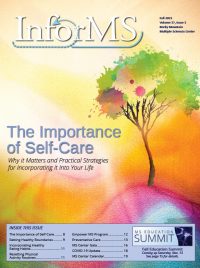It’s certainly no secret that exercise is an important part of general health and wellness. The benefits of exercise become much more important when you’re living with MS.
Physical activity is critical to help prevent additional chronic illnesses, or “comorbidities.” These include high blood pressure, type 2 diabetes, arthritis, and even certain types of cancer. These other illnesses stress the nervous system and increase the impact of MS on neurologic function. Regular exercise is proven to reduce your risk of developing many of these comorbidities.
Exercise can help reduce stress and anxiety, which in turn can ward off feelings of depression. Research studies have shown that depression is the second most common symptom of MS, just behind fatigue. Approximately 50% of MS patients are taking anti-depression medications as part of their medical treatment for MS. While regular exercise surely isn’t a cure for depression, it can be an important part of helping treat the condition. Interestingly enough, exercise can also help combat MS fatigue. Multiple studies have demonstrated the positive impact that exercise has on reducing fatigue, increasing neurological reserve, and improving overall quality of life in people living with MS. In “Exercise in Multiple Sclerosis,” published in the EPMA Journal in 2011, authors declared: “MS patients end up in a vicious circle: out of a wish to reduce fatigue they decrease physical activity which over time reduces endurance, muscle strength, and quality of life and may enhance fatigue, which then thus in turn further limits physical activity and social life.”
One key is figuring out how much exercise is helpful to you and how much is too much. You can avoid overdoing it by starting small. Consider making it a priority to move for just a couple of minutes several times throughout the day. Set an alarm on your phone to ring every hour if you need a reminder to get up and walk for 5 minutes. It is very important that you get some movement in at various times throughout the day and you aren’t sedentary for long periods, even if you also get a 30-60 minute vigorous workout in at some point. The American College of Sports Medicine, American Heart Association, and Medical Associations all recommend 150 minutes of activity per week, but that can be broken up into 3 ten minute periods 5 days a week, or whatever works for you. When you’re having trouble getting motivated for exercise, try to focus on all of the many benefits that will result from it.
For additional information on the benefits of a more active lifestyle, including an interview with Dr. Jeffrey Hebert, Physical Therapist, please check out the Spring 2019 issue of InforMS, “Exercising Your Brain.”
What are some ways that we can restart (or kick-start) our healthy habits if we are in a rut? It can be hard to form new habits at any time, and especially during a time when routines are continually being disrupted. Turn back to page 11 for some tips on how to re-start healthy habits.







